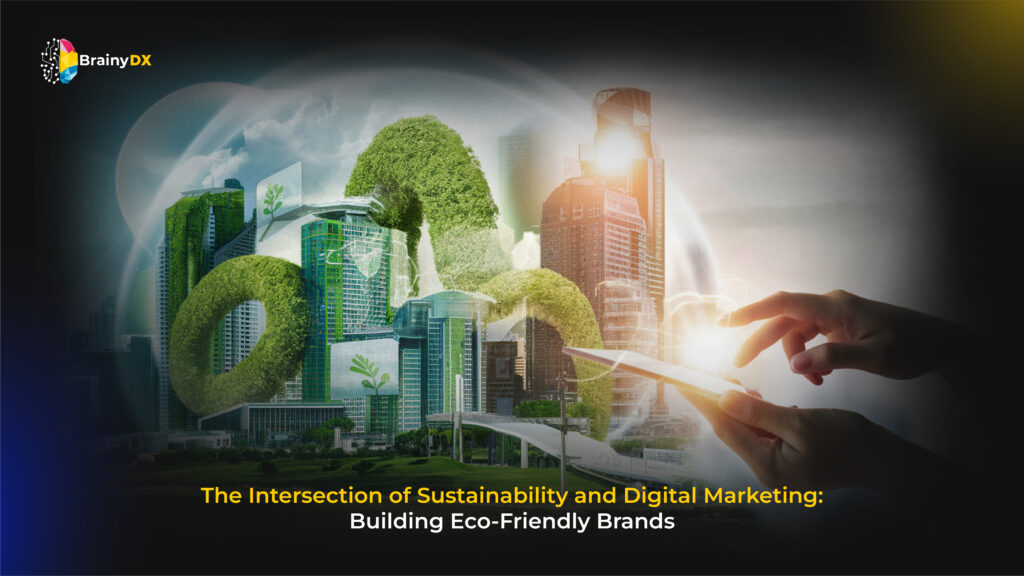Sustainability and Digital Marketing: Building Eco-Friendly Brands
Sustainability and Digital Marketing: Building Eco-Friendly Brands

In today’s digital age, sustainability and digital marketing have come together to create a powerful force for positive change. As the world becomes more aware of environmental issues, businesses are making sustainability a central part of their values. In this article, we’ll look at how digital marketing can be used to build eco-friendly brands that not only help the planet, but also connect with consumers who care about sustainability.
Digital Marketing in Promoting Sustainability:
Digital marketing has transformed the way businesses interact with their target audience. It gives brands a platform to amplify their sustainability efforts and engage with consumers who care about environmental issues. Brands can utilize various online channels like social media, content marketing, and email campaigns to effectively communicate their eco-friendly initiatives, share educational content, and inspire their audience to take positive action.
Crafting an Eco-Friendly Brand Identity:
To build an eco-friendly brand, it’s essential to develop a sustainable brand identity that aligns with the values of your target audience. This means incorporating sustainability into your brand’s story, visuals, and overall messaging. By clearly communicating your commitment to environmental responsibility, you can attract consumers who prioritize sustainability in their buying decisions and who will be drawn to your brand’s eco-friendly focus.
Leveraging Social Media for Sustainable Messaging:
Social media platforms offer a great way for brands to engage with a wide audience and spread the message of sustainability. By creating compelling, shareable content, brands can raise awareness about environmental issues and showcase their sustainable practices. Encouraging user-generated content that promotes eco-friendly living and involving your audience in sustainability initiatives can help foster a sense of community and shared responsibility around these important issues.
Content Marketing: Educating and Inspiring Change:
Content marketing is crucial for educating consumers about sustainable practices and inspiring them to make more environmentally conscious choices. By creating informative and engaging content, brands can establish themselves as thought leaders in sustainability. This could involve sharing tips for eco-friendly living, highlighting the benefits of sustainable products, and showcasing success stories of individuals or organizations making a positive impact on the environment. Through this educational approach, brands can empower their audience to adopt more sustainable behaviors.
Influencer Partnerships: Amplifying the Message:
Collaborating with influencers who share your brand’s values can be a powerful way to amplify your sustainability message. Look for influencers who are passionate about environmental causes and have an engaged following. By partnering with them, you can reach a larger audience and leverage their influence to inspire positive change. Authenticity and transparency are crucial when selecting influencers to ensure a genuine connection between them and your brand’s sustainability efforts. This approach allows you to tap into the trust and credibility that influencers have built with their audience, further strengthening your brand’s commitment to sustainability.
Measuring and Communicating Impact:
Building trust and credibility is essential for eco-friendly brands. To achieve this, it’s important to measure and communicate the impact of your sustainability initiatives. Use key performance indicators (KPIs) to track and evaluate the effectiveness of your efforts. Openly share your progress and achievements with your audience, demonstrating your commitment to transparency and continuous improvement. This approach fosters a sense of trust and loyalty among consumers who prioritize sustainability, as they can see the real impact your brand is making.
Conclusion:
The convergence of sustainability and digital marketing presents a remarkable opportunity for brands to make a positive environmental impact while also building a loyal customer base. By incorporating sustainable practices into their brand identity, leveraging the power of social media and content marketing, partnering with influential voices who share their values, and transparently communicating their impact, brands can create a lasting, meaningful impression in the minds of environmentally conscious consumers. This symbiotic relationship between sustainability and digital marketing allows brands to become forces for positive change, resonating with today’s consumers who are increasingly prioritizing eco-friendly values in their purchasing decisions.
Remember, building an eco-friendly brand is an ongoing journey. By continuously innovating and evolving your sustainability practices, you can inspire others and contribute to a better future for generations to come.





